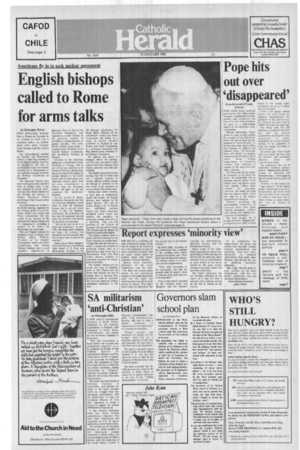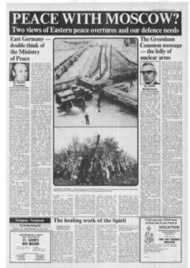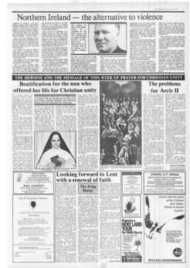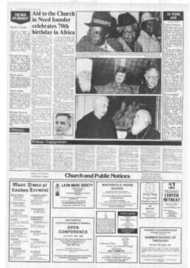Page 1, 21st January 1983
Page 1

Report an error
Noticed an error on this page?If you've noticed an error in this article please click here to report it.
Tags
Share
Related articles
Rome Meeting Discusses Us Bishops' Nuclear Draft
Bishops May Endorse Civil Disobedience On Arms
Mrs Thatcher Tries To Square Cardinal Hume
A Stockpile Of Problems For Mr Pym
Bishops Call For Total Nuclear Disarmament
Americans fly in to seek nuclear agreement
English bishops called to Rome for arms talks
by Christopher Howse TWO ENGLISH bishops flew to Rome on Tuesday in an attempt to work out a common policy on nuclear arms with other bishops from Europe and the United States.
The unprecedented meeting on Tuesday and Wednesday follows a week long meeting of all the English bishops, who had set themselves the task of clarifying the issues over nuclear weapons, as a consequence of the statement on peace issued by the Bishops' Conference in November.
The American bishops have been working towards a pastoral letter on nuclear arms. It has now reached its second draft. This has been widely leaked and the bishops are waiting on further discussion before publishing a final Church policy statement.
Cardinal Hume was invited to the Rome meeting, organised by the Vaticah curia's Council for Public Affairs and Justice and Peace Commission. He was unable to go, because of the meeting's last-minute timing and his engagements, including a sermon in St Paul's on Wednesday, for unity week.
The two English bishops he delegated to go to Rome were Bishop James O'Brien, President of the bishops' International Justice and Peace Commission, and Bishop Thomas Holland, once a naval chaplain, experienced in diplomacy from his days at the Apostolic Delegation, and regarded as a senior member of the hierarchy capable of providing a cutting analysis of nuclear morality. Two other British bishops joined them — Cardinal Gray. President of the Scottish Bishops' Conference, and Archbishop Winning of Glasgow.
Included in the American delegation is Archbishop Joseph Bernardin of Chicago, who is one of the new cardinals to be created in February. He has been deeply involved in the debate on nuclear morality in the United States, and his reservations over American defence policy have led some commentators to believe that the European bishops will have to try and moderate the Americans' position.
On his arrival in Rome, Archbishop Bernardin said that the American delegation would listen to what the European bishops had to say and report back to the US Bishops' Conference. He underlined the fact that the proposed pastoral letter was intended to be strictly for American consumption.
"All we are here to do is to listen and to dialogue," he said. "We will bring back whatever we hear. In revising the document, we will certainly take into account what we hear at the meeting."
Other United States delegates at the meeting were: Archbishop John Roach of St Paul and Minneapolis, President of the US Bishops' Conference; Fr Bryan Hehir, Director of the conference's Justice and Peace Commission and author of a study of nuclear morality published in England by our Justice and Peace Commission as a discussion document; and Mgr Daniel Howe, Secretary of the Bishops' Conference.
No agenda was given to delegates before the meeting, and they were not asked to take experts with them. Bishops from France, Germany and Italy also attended.
The English expectation of the meeting was that it would sort out a coherent response to nuclear defence policies among the bishops of countries in the free world which possessed or were involved with nuclear arms.
During their week's meeting, at New Hall in Chelmsford, earlier this month, the English bishops were address by Fr Roger Ruston, OP, and Fr Gerard Hughes, SJ. Fr Ruston has published another Justice and Peace discussion pamphlet which comes out against the morality of possessing nuclear arms even as a deterrent. This was the position of the Church of England working party's report The Church and the Bomb. Fr Hughes is a moral theologian.
The English bishops want to make clear their backing for the Pope's position on nuclear arms. Though this does not descend to detail, it accepts the morality of possessing nuclear arms as a deterrent as a step on the way to disarmament. Pope John Paul wishes nations urgently to undertake reduction of nuclear arms on all sides.
The English bishops do not accept the jump in argument made in The Church and the Bomb that because the use of nuclear arms is immoral their possession need be immoral. Nor have the American bishops committed themselves to this view.
blog comments powered by Disqus











